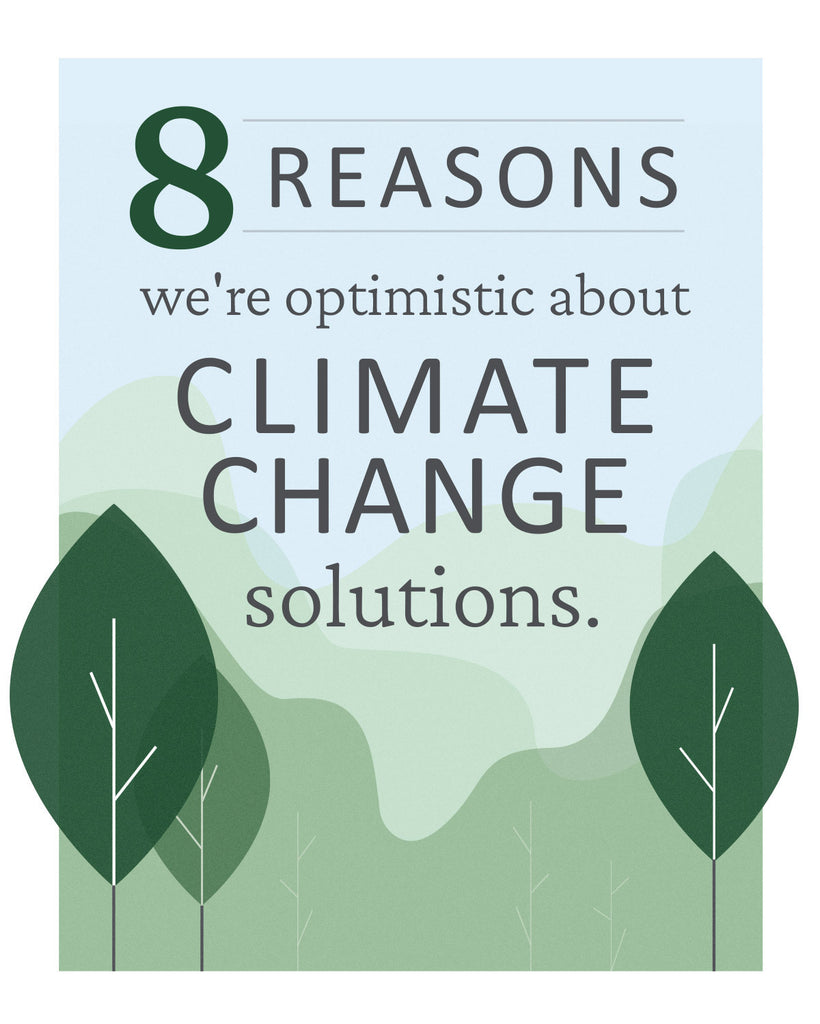
8 Reasons To Be Optimistic About Climate Change in 2022
8 Reasons To Be Optimistic About Climate Change in 2022
By Kelly Baron
At first blush, it may seem foolish—dangerous, even—to entertain the idea of being optimistic about climate change. But with the amount of doom and gloom we’re exposed to on the subject, people are looking for reasons to stay hopeful. Happily, those reasons abound. While it’s no substitute for action, and certainly no reason to stay complacent, it’s heartening to see why the common refrain of “it’s too late” is simply false. Read on to discover why we’re feeling optimistic about the fate of our climate.
1) Adaptation is astounding. After the Deepwater Horizon oil spill in 2010, the world was reeling from the disastrous hit to marine life. Soon, however, scientists discovered tiny oil-eating bacteria were actually degrading the oily refuse on the ocean’s surface. Now, we can see similarly amazing adaptations occurring in today’s world. Coastal plants and animals have begun to colonize plastic pollution. Birds are building nests with plastic. Even humans are joining in: check out the floating houses in Amsterdam for proof that life on water can work. There may come a day where we’ll reminisce about the environment of our past, but we may not even be able to imagine how we’ll adapt to the future.
2) Renewable energy is getting cheaper and more common. The numbers for renewable energy grow more and more promising each year. In 2021, renewable electricity generation is set to expend by over 8 percent. This is the fastest growth since the 1970s. Additionally, prices of clean energy are plummeting. Utility-scale solar power declined in cost by 90 percent between 2009 and 2021. Onshore wind power also declined by over 70 percent during that time.
3) Schools are leading the way. Rainwater harvesting, solar panel usage and battery storage, discounted public transit, and even zero waste are some of the outstanding achievements that are becoming more and more common in universities across the world. The University of Southern California recently announced the goal of achieving zero waste by 2028. Colorado College achieved carbon neutrality last year. Harvest is divesting from fossil fuel. If universities—which are essentially microcosms for larger communities—can achieve these lofty goals, public legislation is within reach.
4) Electric vehicles are about to reign supreme. Get ready for EV’s to have their moment! Global sales of electric vehicles increased by 168 percent in the first half of 2021 (compared to 2020). Preorders are so high that many companies are doubling up on production. They’re sleek, eco-friendly, and reasonably priced. We’re looking forward to the day when we can tell our grandchildren that we used to use a foul-smelling, barbarically-sourced fuel to “recharge” our old cars. They won’t believe us!
5) Listen to what the experts are (actually) saying. We so often grimace at those in our circle who dismiss the words of scientists. But some of us are guilty of the same thing! Saying “it’s too late” is too easy, and is not the real narrative of our scientific community. What this refrain does is excuse us from taking action. Climate experts are the ones saying that we still have time to do something to combat climate change. Believe them.
6) Farming practices are evolving. Farmers are among the first-responders of the climate crisis. They’re forced to adapt to the changing climate in drastic ways that the average citizen isn’t—and are proving that it works. Technological innovations are rationing water usage, and sustainable practices are improving soil health. Take the coffee farms in Brazil — they’re using climate-smart agriculture to combat the disastrous effects of frost, and the health of the crops is rebounding while native vegetation is being restored. Sustainable farming is the future.
7) Fossil fuel divestment is hugely popular. $40 trillion in endowments and portfolios has vowed to abstain from investing in coal and gas and oil. Universities and banks are divesting from fossil fuels in droves (call your bank and make sure yours has!). China has vowed to stop funding new coal plants abroad, and Michael Bloomberg has committed to shutting down coal plants in 25 countries. Coal is on its way out.
8) Change takes time, and progress is not linear. This is a tough truth to remember during trying times. But taking action is always the most important thing, even if it takes longer than expected to get results. It took organizers at Harvard University ten years to achieve divestment from fossil fuel. That’s a lot of time that the effort could have been deemed a failure; luckily, persistence prevailed, and now it’s a global movement. Every action matters, even if its effect is not immediately visible. Keep taking action.

